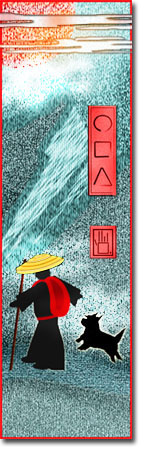On The Way: The Daily Zen Journal
West Evening Mountain Talk – Part 4
Muso Soseki (1275-1351)
The monk asked, “Zen masters these days give a koan to their disciples. This makes students study words, doesn’t it?”
The Master answered, “No, it doesn’t. Yuan-wu said, ‘Students who have just started Zen practice have no idea about it. So out of compassion, the masters give them a koan as a signpost, so that the disciples can devote themselves to discovering oneness, dispelling random illusions, and to realizing finally that Original Mind is not something that comes from outside. After that, all the koans turn out to be pieces of tile for knocking at the gate.’
“Do you consider this explanation of Yuan-wu’s a deception? You must understand that Zen masters give their disciples a koan simply in order to guide them through the Gate of Satori into their own homes.
“Ta-hui used to cite a passage from some forerunner’s sermon to his own students: ‘Don’t try to use your intellect to grasp the truth. Don’t just swallow everything that has been preached. And don’t lock yourself up in the storehouse, where nothing happens.’

“This teaching is a sign of Ta-hui’s deep, grandmotherly kindness. With it, he blindfolds your eyes to let you see with your mind. You can understand from this that it is not words at all that Ta-hui wants you to study. Any students who have succeeded in returning their minds to the Original Silence by sitting on the zazen cushion, but are still content with their marvelous skill with words, are still a long way from the true study of mind.
“Yuan-wu says, ‘The phrase ‘This mind, the Buddha’ shows the truth as plainly as though it were seen through a wide-open gate. The other one, ‘No mind, no Buddha,’ forces one to face the truth directly and see through it. Without getting stuck in these words, pass right through them, and then you will see clearly the whole mind of the Patriarchs unveiled.
“If you get stuck in the words, you will never attain enlightenment. He says beside, ‘If you are someone with great inborn genius, there is no need to make a study of the old words and koans.
‘When you wake up in the morning, make your mind clear and calm. Whatever has to be done then, do it as well as you can. Afterward, think it over carefully, and see what you have done and what it amounts to. When you have done these things thoroughly, you will find yourself right there in the monastery of purity and no-happening.
“These two masters set forth the very core of Zen practice. But most students these days fish words and dialogues of the masters out of books and store them in their heads until they have a chance to spar with others. Using their cleverness in Zen talk, they flatter themselves that they have attained the subtle way of the Patriarchs. But this is just what Yuan-wu calls conceit and delusion.”
The monk questioned him again: “Those students who repeat Zen stories secondhand, and swallow hearsay and gossip, and convince themselves that they have attained satori, are of course full of conceit and delusion. But there are some very gifted students who have penetrated to the core of Zen words. Are they not to be called people of satori?”
The Master answered, “Even those who have a keen insight into Zen words are to be called people accomplished in words but not in mind unless they have attained clear satori. As for those who merely pass on second-hand stories, swallow rumors, and gossip, they are not worth commenting on.
“A master says, ‘Just grasp the essence, don’t concern yourself with the results.’ Attaining genuine satori is the essential. The manifestation of its great working is the result. It’s like planting a tree. If the root goes deep, the leaves and flowers, and fruit will be sure to flourish.
The monk asked, “If words and letters have a bad influence on students at the beginning, why did the masters in the past leave so many words of different kinds which are now widely used?”
The Master answered, “Those masters of discerning insight had a perfect command of words, and they used their skill to teach their disciples. Each word or phrase may show a different aspect of Zen, but each is not more than a means—like the woman’s call for her maid, not for an errand but simply so that her lover would hear her voice and know that she was there inside the window.
“The masters’ words did no harm to their students, and some bright ones grasped the essential beyond those words. But with the passage of time, misunderstandings inevitably occurred. Many stupid people came along, like the man who dropped his sword into the current from his moving boat and marked the side of the boat to show where it fell, and then searched in the water underneath.“
Muso Soseki (1275-1351)
Excerpted from Sun At Midnight – Poems and Sermons translated by W.S Merwin and Soiku Shigematsu 1989





Ah, to be able to sit and discourse with someone like Muso! Suddenly everything is crystal clear…the traps we set for ourselves, the spirited way we manage to fool ourselves, and the limited great insights we have.
Sometimes it seems if we can just continue unseating ourselves from our positions of comfort, all will be well. The story of the Blue Cliff Record collection is one worth sharing. How many of us have read koan collections only to realize they are like collections of ashes?
The remains of someone else’s encounter with a Zen master. A brief moment in time where genuine insight occurs. Koan study can be genuine, but what about our own life koans?
We have all been presented with teachings and koans; many are discarded as not up to our “level of understanding” or not recognized for the powerful tools they actually are. We look too often to others to provide the challenge, the koan, the kernel of teaching that is going to help us break through our illusions. The other side of that is Yuan-wu’s description of an exceptional student, the one we think sometimes we just might be!
“If you are someone with great inborn genius, there is no need to make a study of the old words and koans. When you wake up in the morning, make your mind clear and calm. Whatever has to be done then, do it as well as you can.
“Afterward, think it over carefully, and see what you have done and what it amounts to. When you have done these things thoroughly, you will find yourself right there in the monastery of purity and no-happening.“
Well, maybe not quite “inborn genius,” but we still find ways to stay inspired and keep our minds close to the Way….
“Great effort, no goal.”
Humbly yours,
Elana, Scribe for Daily Zen